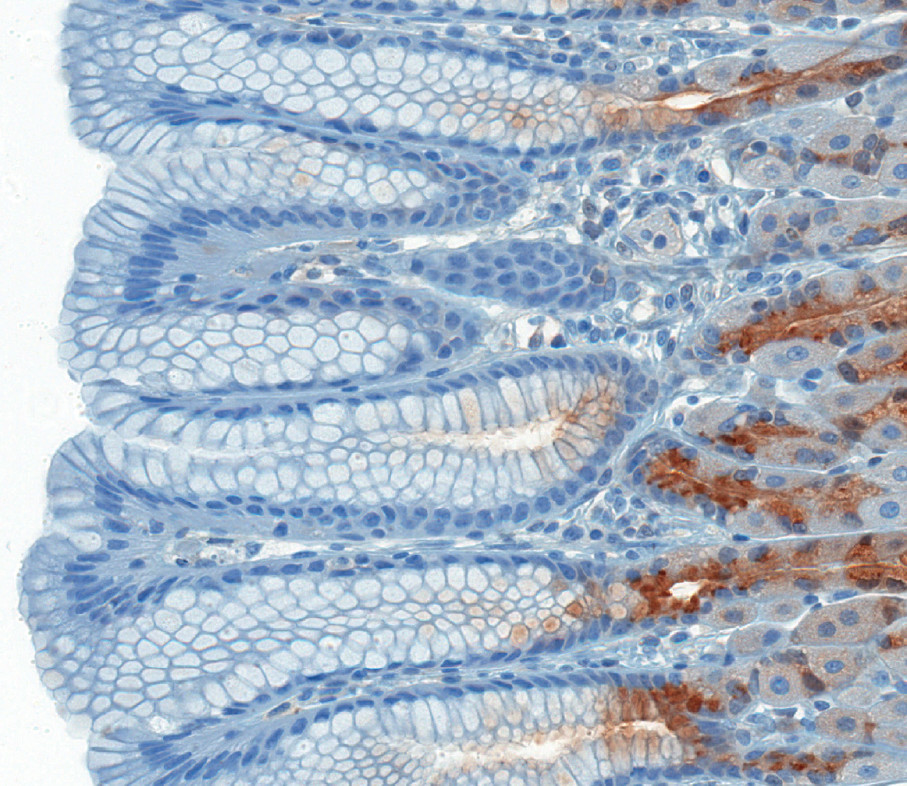Standard IHC Protocol
Atlas Antibodies standard immunohistochemistry protocol

Described is the Atlas Antibodies standard immunohistochemistry protocol optimized for Triple A Polyclonals and PrecisA Monoclonals.
Deparaffinization
Paraffin sections of 4 µm thickness are baked overnight at 50°C. Prior to immunostaining, deparaffinization and hydration are performed in xylene and graded ethanol to distilled water. During hydration, we perform 5 minutes blocking for endogenous peroxidase in 0.3% H2O2 in 95% ethanol.
Antigen retrieval
1. Standard antigen retrieval method
The standard antigen retrieval method is Heat Induced Epitope Retrieval (HIER) in retrieval buffer pH 6,1, using a pressure boiler (Decloaking chamber, Biocare Medical, Walnut Creek, CA, USA) as a heat source. HIER is performed by heating the TMA-slides immersed in retrieval buffer for 20 minutes at 110°C in the pressure boiler. After completed boiling, slides remain in the pressure boiler and are allowed to cool to 90°C. The total processing time is approximately 60 minutes.
NOTE: The specified working dilutions of the primary antibodies are to be considered as a guideline only. Optimal dilutions must be determined by the user.
2. Alternative antigen retrieval methods
For selected antibodies, alternative retrieval buffers and/or enzymatic antigen retrieval may have been used as stated in the Product Datasheet and on the Antibody/ Antigen information page on the Human Protein Atlas.
Enzymatic antigen retrieval method
Enzymatic retrieval is performed in the immunostaining instrument and refers to incubation of TMA-slides in Proteinase K (Lab Vision, Freemont, CA, USA) for 10 minutes at room temperature.
Heat-Induced Epitope Retrieval (HIER) in Retrieval Buffer pH 9
HIER is performed in Target Retrieval solution pH 9 (Dako, Agilent, Santa Clara, CA, USA) using Decloaking Chamber NxGen as described above.
Immunohistochemical staining program
Autostainer 480 staining program
(ThermoFisher Scientific, Waltham, MA, USA)
All incubations are performed at room temperature.
All reagents are applied at a volume of 300 µl per slide.
- Rinse in wash buffer.*
- Incubation with Ultra V Block for 5 min.
- Rinse in wash buffer (x2).
- Incubation with primary antibody for 30 min.
- Rinse in wash buffer (x3).
- Incubation with Primary Antibody Enhancer for 20 min.**
- Rinse in wash buffer (x2).
- Incubation with labeled polymer for 30 min.
- Rinse in wash buffer (x2).
- Developing in DAB solution for 5 min.
- Rinse in distilled water.
- Counterstaining in hematoxylin for 5 min.***
- Rinse in tap water for 5 min.
- Rinse in lithium carbonate (Li2CO3) water, diluted 1:5 from saturated solution for 1 min.
- Rinse in tap water for 5 min.
- Dehydration in graded ethanol and xylene.
- Mount in Pertex.
- Coverslip.
* Steps 1 – 11 are performed in Autostainer 480S (ThermoFisher Scientific, Waltham, MA, USA).
** For polyclonal antibodies skip steps 6 and 7.
** Steps 12 -18 are performed in fully automated integrated stainer Leica ST5010-CV5030 (Leica Biosystems Nussloch GmbH, Nussloch, Germany).
Reagents
For immunohistochemistry, the following reagents are commercially available from Thermo Fisher Scientific, Waltham, MA, USA:
- Wash buffer (10x concentrate). Working solution originally contains 0.05% (v/v) Tween 20. Extra Tween 20 is added to a final concentration of 0.20%.
- Antibody diluent
- UltraVision LP HRP polymer®
- Primary Antibody Enhancer (only for monoclonal antibodies)
- Ultra V Block
- DAB Quanto Detection System (including chromogen and substrate)
For epitope retrieval, the following buffers are commercially available from Dako, Agilent, Santa Clara, CA, USA:
- Target Retrieval Solution, Citrate pH 6.1 (10x)
- Target Retrieval Solution, pH 9 (10x)
In addition, Mayer’s hematoxylin and xylene (Histolab, Gothenburg, Sweden) are used.


